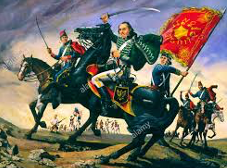Casimir Pulaksi was a Polish soldier who for fought the U.S. during the Revolutionary War. An excellent horseman and strategist, he has often been referred to as the founder of the American cavalry. 
He was born in Warsaw, Poland, on March 6, 1745. His family was established in the Polish aristocracy, and he received an education commensurate with that status. He joined his family in the Confederation of Bar, an attempt to free Poland from Russia's influence in the 1760s. He was involved in several battles and demonstrated a strong ability to organize mobile troops against the enemy. 
Pulaski was accused of treason in 1771, and he fled to France. While there, he was commander of a group of soldiers fighting in the Russo-Turkish War. More importantly, also while he was in France, he met Benjamin Franklin, who was at that time an ambassador to France. Franklin was so impressed with Pulaski's story and his abilities that he wrote a letter of introduction for him to General George Washington. Pulaski sailed for America in June 1777. Despite his past successes and his obvious skill as a cavalry officer, the Continental Army wasn't quite ready to give Pulaski an official command. He volunteered to serve on the general staff and got the chance to distinguish himself at the otherwise dismal Battle of Brandywine by leading a charge to cover the American attack that ended up saving Washington's life. Washington was so impressed with Pulaski's performance that he gave him command of a cavalry troop. This troop fought at Trenton and was with the Continental Army as they lived through the dismal winter at Valley Forge, during which Pulaski and "Mad" Anthony Wayne were responsible for the Army's provisions. Not for the first time, Pulaski had a difference of opinion with a high-ranking official, and he resigned his command in March 1778. He soon had another chance at command, of a newly created cavalry group, and he took it. It wasn't exactly a battle situation: He and his men protected supplies at Egg Harbor, N.J. The troops suffered badly in a surprise British attack in October 1778. Next for Pulaski were two commands in the south: one in Charleston and the other in Savannah. At both places, he launched a straight attack on heavily fortified locations. The second attack cost him his life. He survived the initial grapeshot hit but died a few days later, on Oct. 11, 1779. |
|
Social Studies for Kids
copyright 2002–2026
David White


